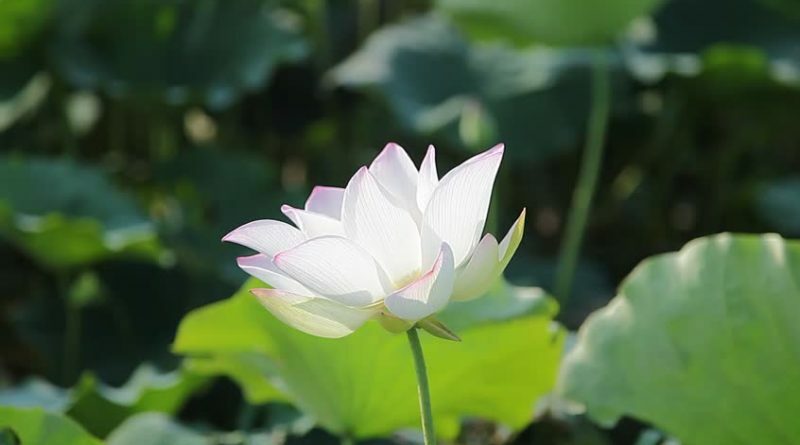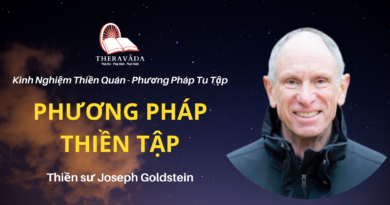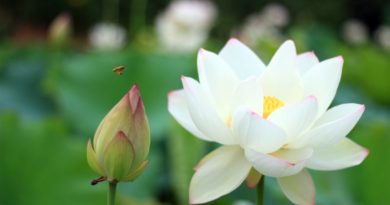FUNDAMENTALS OF VIPASSANA MEDITATION – CHAPTER VI
FUNDAMENTALS OF VIPASSANA MEDITATION – CHAPTER VI: What Time?
The question now arises: What do we meditate on the grasping aggregates for? And, as regards time, what time do we meditate on, the past, the future, the present, or indefinite time?
What do we meditate for? Do we meditate on the aggregates of grasping for worldly wealth? For relief from illness? For clairvoyance? For levitation and such supernatural powers? Insight meditation aims at none of these. There have been cases of people who get cured of serious illness as a result of meditational practice. In the days of the Buddha persons who got perfected through insight meditation had supernatural powers. People today may have such powers if they get perfected. But fulfilment of these powers is not the basic aim of insight meditation.
Shall we meditate on phenomena past and gone? Shall we meditate on phenomena not yet come? Shall we meditate on the present phenomena? Or, shall we meditate on phenomena which are neither past, future nor present, but which we can imagine as we have read about them in books?
The answer to these questions is: we meditate to not grasp and we meditate on what is arising.
Yes, people not practised in meditation grasp at the rising mind and matter every time they see, hear, touch, or become aware of. They grasp at them with craving – are pleased with them. They grasp at them with wrong views, as permanent, happy, as the I, the ego. We meditate in order not to let these grasping arise, to be free from them. This is the basic aim of insight meditation.
And, we meditate on what is arising. We do not meditate on things past, future, or indefinite in time, Here we are speaking of practical insight meditation. In inferential meditation we do meditate on things past, future, and indefinite in time. Let me explain. Insight meditation is of two kinds, practical and inferential. The knowledge you gain by meditating on what actually arises by way of characteristic, function and manifestation is practical insight. From this practical knowledge you infer the impermanence, suffering and not self of things past and future, things you have not experienced.
This is inferential insight.
“The fixing both (unseen and seen) as one by following the object…”
Patisambhida
The Path of Purity explains this statement as follows:
” …. by following, going after the object seen, visually determining both (the seen and unseen) as one in intrinsic nature: as this (seen) one, so what goes as complex broke up in the past and will break up in the future also.
Visuddhi Magga_
“The object seen” – this is practical insight. And “going after the object seen … determining both … in the past … in the future” – this is inferential insight. But here note: the inferential insight is possible only after the practical. No inference can be made without first knowing the present.
The same explanation is given in the commentary on Kathavatthu.
“Seeing the impermanence of even one formation, one draws the conclusion as regards the others, as impermanent are all the things of life.”
Why dont we meditate on things past or future? Because they will not make you understand the real nature and cleanse you of defilements. You do not remember your past existences. Even in this existence, you do not remember most of your childhood. So, meditating on things past, how can you know things as they really are with their characteristics and functions?
Things of the more recent past may be recalled. But, as you recall them, you think,
“I saw, I heard, I thought. It was I who saw at that time and it is I who am seeing now.”
There is the “I” notion for you. There can even be notions of permanence and happiness. So recalling things past to meditate on do not serve our purpose. You have grasped them and this grasping is hard to overcome. Although you look on them as mind and matter with all your learning and thinking, the “I” notion persists, because you have already grasped it.
You say “impermanent” on the one hand, you get the notion “permanent” on the other. You note suffering, but the notion “happiness” keeps turning up. You meditate on not self, but the self notion remains strong and firm. You argue with yourself. In the end your meditation has to give way to your preconceived ideas.
The future has not yet come, and you cant be sure what exactly it will be like when it comes. You may have meditated on them in advance but may fail to do so when they turn up. Then will craving, wrong view, and defilements arise all anew. So, to meditate on the future with the help of learning and thinking is no way to know things as they really are. Nor is it the way to calm defilements.
Things of indefinite time have never existed, will not exist, and are not existing, in oneself or in others. They are just imagined by learning and thinking. They are high sounding and look intellectual, but on reflection are found to be just concepts of names, signs and shapes.
Suppose someone is meditating:
“Matter is impermanent; matter rises moment to moment and passes away moment to moment.”
Ask him: What matter is it? Is it matter of the past or the present or the future? Matter in oneself or in others? If in oneself, is it matter in the head? The body? The limbs? The eye? The ear? You will find that it is none of these but a mere concept, an imagination. So we do not meditate on indefinite time.









